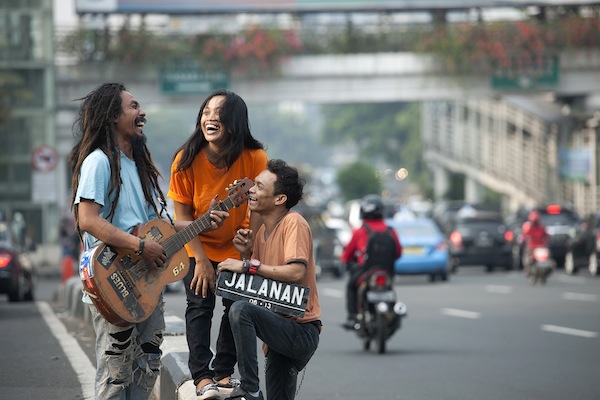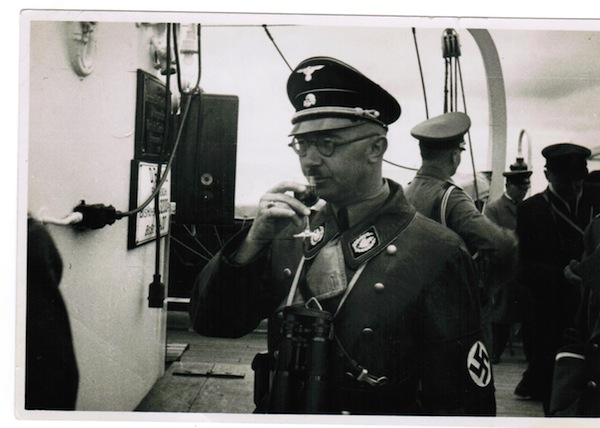Ilya Kabakov is the subject of Amei Wallach’s lya and Emilia Kabakov: Enter Here. (photo from VIFF)
This year’s Vancouver International Film Festival (Sept. 25-Oct. 10) will take viewers on a rollercoaster ride, if the films reviewed by the Independent this week are any indication. We went from soaring heights of imagination and freedom with Ilya and Emilia Kabakov: Enter Here to the music-filled yet poverty-ridden streets of Jakarta in Jalanan to the horrifyingly shallow depths where evil is normal in The Decent One.
“What interests me is where is the border between reality and the dream,” says artist Ilya Kabakov in Enter Here. With this film that the Jewish Independent has sponsored at VIFF, Amei Wallach follows Ilya and his wife and partner Emilia Kabakov in the months leading to a massive retrospective in Moscow in 2008. She captures the couple’s personalities: Ilya, with his mind anywhere but on earth, still traumatized by his life – and that of his mother, who led a very difficult existence – in the Soviet Union, which he escaped in 1987, and Emilia, the organizer, fearless. The exhibit marked his first return to Russia, and there is trepidation about how it will be received, and how he will handle his memories.
Kabakov’s paintings and installations are unbelievable. They inspire contemplation and awe at their scope and creativity. Most of the ones highlighted in the documentary critique what Russia would have been – and seemingly has become again – to live in: the surveillance, distrust, harshness, bureaucracy. His works are influenced by various events and people, including his mother who, at his behest, wrote a diary when she was in her 80s.
In his New York studio, Kabakov reflects on three types of losers: mankind in principle, his feelings about himself despite his self-acknowledged success, and his reaction to Russia. He describes Russia as “permanent rainy,” and speaks of life there as “two-faced,” the public front and the personal. As a non-state-sponsored artist, he created much work, but only exhibited twice in his home country. For Kabakov, for whom the museum is akin to the church, “The last haven of our history and our spirit,” this alone would have been reason to flee. For the many around the world who have glimpsed his great mind through his work, we’re very lucky he did.
***

Director Daniel Ziv obviously fell in love with the street musicians he profiles in Jalanan. Their aspirations, energy, passion, kindness, and resilience – he communicates all of it, such that you almost don’t notice it’s a documentary about poverty, development, corruption, and the treatment of women, the place of art in society, and other such weighty subject matter.
Of the 12 million people living in Indonesia’s capital city, some 7,000 earn their living as buskers, according to the film, and Jalanan follows the lives of three of them – Boni, Ho and Tuti – over a five-year period. In the face of hardship, the troubadours remain optimistic and driven to create and share their music. Nothing gets them down: Boni and his family are evicted from their 10-year “home” under a bridge, Ho gets jailed for just being on the streets and Tuti is unable to live with any of her three children.
As writes Ziv in a director’s statement, “This isn’t the type of documentary that feeds off tragedy … this is not about thousands of lives being threatened … this isn’t even about the poorest of the poor. Rather, Jalanan traces the lives of a forgotten, marginalized community that slips through society’s cracks. The dilemmas and conflicts here represent a huge segment of urban population in the developing world…. This film is meant to give them a voice, to raise awareness for their conditions and struggle.”
Ziv takes the awareness beyond the film, with a campaign to raise money to buy homes for Boni, Ho and Tuti: fundrazr.com/campaigns/dgEM6.
***

And then, there is a person like Heinrich Himmler, who could write home to his family with love and affection while on a trip visiting concentration camps. Vanessa Lapa’s The Decent One is based on personal letters, documents and photographs that were found in the Himmlers’ home by U.S. soldiers in 1945, but which weren’t handed over to the military authorities. They became the property of Lapa’s father somehow, and she has used them to make this documentary.
The Decent One is very stylized. Voice actors read the letters, diary entries and documents from Himmler, his wife, daughter, mistress and others, archival footage has sound effects and/or music added, and benign-sounding excerpts from the writings are juxtaposed against brutal images. Viewers follow Himmler from a young age to his rise in the Nazi party and through much of the war. The cumulative effect is powerful. The most upsetting and scary conclusion is that understanding evil is nigh impossible.

